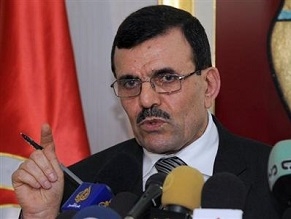|
World Jewish News

New Tunisian Prime Minister Ali Larayedh, the successor to fellow Islamist Hamadi Jebali.
|
EU leaders welcome formation of new Tunisian government in the spirit of ongoing democratic transition
14.03.2013, Israel and the World EU foreign policy chief Catherine Ashton led Europe’s leaders in heralding the announcement of a Tunisian government by the country’s National Constituent Assembly, in the aftermath of last month’s administration collapse amidst widespread riots in the North African country.
In a joint statement with EU Enlargement Commissioner Stefan Fule, Ashton welcomed incoming Prime Minister Ali Larayedh, the successor to fellow Islamist Hamadi Jebali, as she expressed hopes it would settle the country’s political and economic crisis, as it continues on its path to full democratic transition following 2011’s popular uprisings which displaced its longtime authoritarian leader Hosni Mubarak.
The news represented a “vote of confidence” claimed their official comment, as they called on all political, economic and civil society representatives to work together “in the spirit of dialogue and mutual respect for the final preparations and approval of a new Constitution and forthcoming elections”.
Jebali was last month forced to resign as head of government, after his ruling Ennahda party failed to support his plans to dissolve the politically unstable governing coalition and replace them with a new government of technocrats. Announcing his stepping down, Jebali warned the forced move amidst a fractious political and social landscape sparked “great disappointment among the people and we must regain their trust and this resignation is a first step”.
The current instability was prompted by the assassination of opposition leader Choukri Belaid earlier in February, which prompted widespread riots and continued delays in drafting the country’s new constitution, leading Jebali to suggest either forming and heading a new government or resigning his post. Whilst his initiative was accepted by opposition groups, it was roundly rejected by his own Islamist party which favoured establishing a mixed coalition of politicians and technocrats.
A former Interior Minister in Jebali’s administration, Larayedh confirmed he had presented his interim coalition government to Presdient Moncef Marzouki, as elections are set for later in the year, with the Muslim Ennahda party retaining control of key ministries including foreign affairs, defence and the interior, with the rest occupied by two secular parties and various independents.
The French foreign ministry issued a statement Thursday reiterating “its full support to Tunisia for the completion of its ongoing transition, in particular the adoption of a new constitution and the holding of elections in the spirit of the universal values which prompted the revolution”.
British Foreign Secretary William Hague echoed the message of support for the new coalition Wednesday as he looked forward “to working with the new administration to strengthen the deep relationship between our two countries across a range of areas of mutual interest”. The UK would continue “to encourage the process of democratisation in Tunisia, offering support to the Tunisian people”, he added.
Elsewhere in Washington, US Secretary of State John Kerry called for “Tunisia’s leaders to work together quickly to finalise a constitution that respects universal human rights, and to develop a plan for elections so Tunisians can vote on their country’s future”. “Announcing a fixed election date will provide clarity about the direction of Tunisia’s democratic transition and will help stabilise the political, security, and economic situation,” he added, as he highlighted key issues for facilitating free and fair elections as freedom of press and access for domestic and international observers.
“The United States remains a friend of the Tunisian people and will continue to support the transition to an enduring democracy in which the rights of all Tunisians are respected and protected,” he vowed.
EJP
|
|
